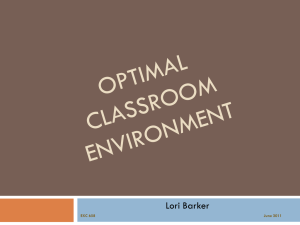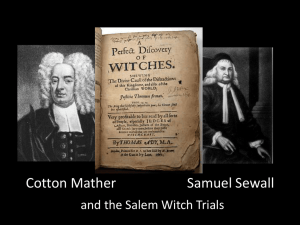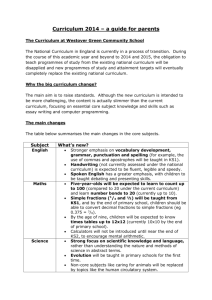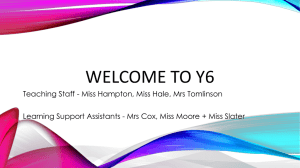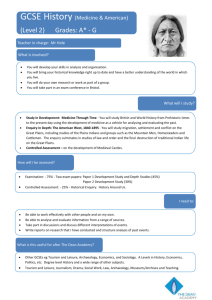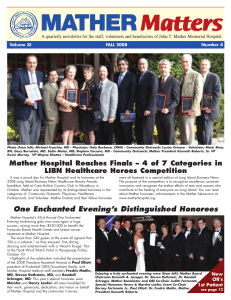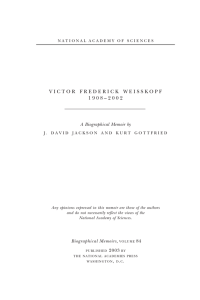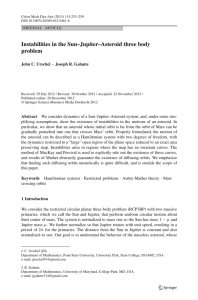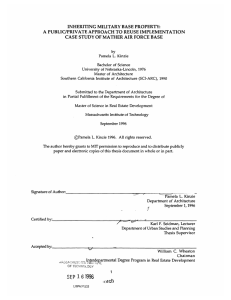Science policy - Leck St Peters C of E Primary School
advertisement
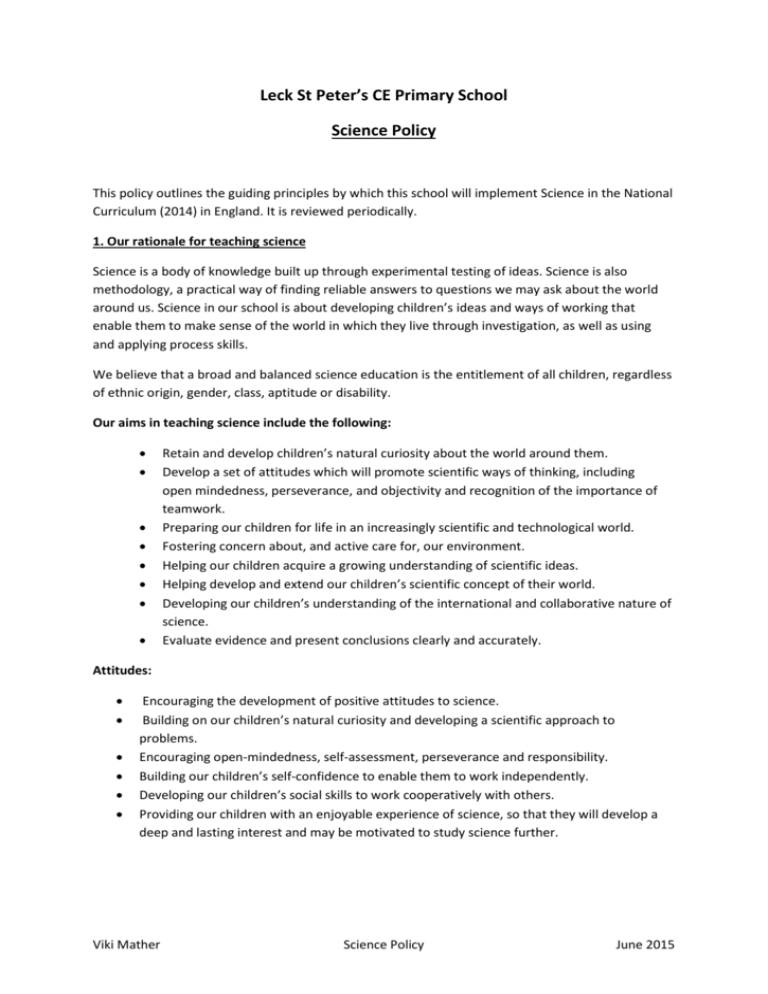
Leck St Peter’s CE Primary School Science Policy This policy outlines the guiding principles by which this school will implement Science in the National Curriculum (2014) in England. It is reviewed periodically. 1. Our rationale for teaching science Science is a body of knowledge built up through experimental testing of ideas. Science is also methodology, a practical way of finding reliable answers to questions we may ask about the world around us. Science in our school is about developing children’s ideas and ways of working that enable them to make sense of the world in which they live through investigation, as well as using and applying process skills. We believe that a broad and balanced science education is the entitlement of all children, regardless of ethnic origin, gender, class, aptitude or disability. Our aims in teaching science include the following: Retain and develop children’s natural curiosity about the world around them. Develop a set of attitudes which will promote scientific ways of thinking, including open mindedness, perseverance, and objectivity and recognition of the importance of teamwork. Preparing our children for life in an increasingly scientific and technological world. Fostering concern about, and active care for, our environment. Helping our children acquire a growing understanding of scientific ideas. Helping develop and extend our children’s scientific concept of their world. Developing our children’s understanding of the international and collaborative nature of science. Evaluate evidence and present conclusions clearly and accurately. Attitudes: Encouraging the development of positive attitudes to science. Building on our children’s natural curiosity and developing a scientific approach to problems. Encouraging open-mindedness, self-assessment, perseverance and responsibility. Building our children’s self-confidence to enable them to work independently. Developing our children’s social skills to work cooperatively with others. Providing our children with an enjoyable experience of science, so that they will develop a deep and lasting interest and may be motivated to study science further. Viki Mather Science Policy June 2015 Skills: Giving our children an understanding of scientific processes. Helping our children to acquire practical scientific skills. Developing the skills of investigation - including observing, measuring, predicting, hypothesising, experimenting, communicating, interpreting, explaining and evaluating. Developing the use of scientific language, recording and techniques. Developing the use of ICT in investigating and recording. Enabling our children to become effective communicators of scientific ideas, facts and data. 2. Our teaching aims Teaching science in ways that are imaginative, purposeful, well managed and enjoyable. Giving clear and accurate teacher explanations and offering skilful questioning. Making links between science and other subjects. Science has four attainment targets and a statement of breadth of study. These are: Sc1 Scientific enquiry; Sc2 Life and living processes; Sc3 Materials and their properties; Sc4 Physical processes. Our role is to teach scientific enquiry through the contexts of the three main content areas. Children in the foundation stage - the reception class are taught the science elements of the foundation stage document through the Early Learning Curriculum: Knowledge and Understanding of the World. 3. How science is structured through the school Planning for science is a process in which all teachers are involved to ensure that the school gives full coverage. The school uses the Lancashire Inspiring Science Scheme of work alongside Rising Stars Switched on Science. Teachers are expected to adapt and modify the model plans to suit their children’s interests, current events, their own teaching style, the use of any support staff and the resources available. Generally, one unit may be taught in each half term. Science teaching in the school is about excellence and enjoyment. We adapt and extend the curriculum to match the unique circumstances of our school. KS1 and Foundation stage teachers should be teaching science for a minimum of one ½ hours each week. KS2 teachers should be teaching science for a minimum of two ½ per week. Because of mixed-age classes in the school, some units may be taught out of their year group. Viki Mather Science Policy June 2015 4. Our approach to science The essential elements describing how science is taught in our school are described below: We have adopted parts of a commercial primary science scheme, which are adapted to our circumstances. We use ICT widely in science. Children are given the opportunity to practice science skills and enhance their presentation using carefully chosen software. We use ICT for enquiry work, including microscopes with digital cameras, video capture of images and activities. We encourage children to ask and answer their own questions as far as practicable. Children complete at least two full enquiries each term, taking increasing responsibility for their planning, carrying them out and recording/interpreting the results. We use cross-curricula links to science with, for example, design and Technology units and mathematics. We develop science informally through science clubs, school visits and other out-of-school activities. 5. Equal opportunities in science Science is taught within the guidelines of the school’s equal-opportunities policy. We ensure that all our children have the opportunity to gain science knowledge and understanding regardless of gender, race, and class, physical or intellectual ability. Our expectations do not limit pupil achievement and assessment does not involve cultural, social, and linguistic or gender bias. We aim to teach science in a broad global and historical context, using the widest possible perspective and including the contributions of people of many different backgrounds. We value science as a vehicle for the development of language skills, and we encourage our children to talk constructively about their science experiences. In our teaching, science is closely linked with literacy and mathematics (see following notes). We recognise the particular importance of first-hand experience for motivating children with learning difficulties. We exploit science’s special contribution to children’s developing creativity; we develop this by asking and encouraging challenging questions and encouraging original thinking. 6. Assessment and recording in science We use assessment to inform and develop our teaching. Topics commonly begin with an assessment of what children already know. Observations of individuals or groups, particularly in the Foundation Stage are carried out. Questioning and discussion is also used to identify misunderstandings. We assess for learning (AFL). Children are involved in the process of self-improvement, recognising their achievements and acknowledging where they could improve. Activities during, and at the end of, each topic record achievement and celebrate success. Viki Mather Science Policy June 2015 We mark each piece of work positively, making it clear verbally, or on paper, where the work is good, and how it could be further improved. The school uses commercial end-of-unit tests to assess learning and point up areas where remedial work is needed. Equally important is the continuous assessment of children’s work, much of which is informal. This assessment is used to inform teaching throughout the school. Reports to parents are made verbally each term, and written once a year, describing each child’s attitude to science, his/her progress in scientific enquiry and understanding of the content of science. The form of recording will depend on the nature of the activity and may include pictorial and written forms. The correct use and development of scientific language is encouraged. 7. Health and Safety In their planning teachers anticipate likely safely issues. They will also explain the reasons for safety measures to the children and ensure that they understand the need to keep themselves safe. Teachers should consider safety for themselves, others, the environment and the resources they use when carrying out scientific activities. 8. Resources Resources are kept in the school hall. Some teacher resources are kept in the classroom. Gaps or weaknesses in resources should be notified to the science co coordinator and will be addressed when funds are available. 9. Curriculum Links English Through written observations, noting predictions and producing results children show evidence of their developing scientific understanding therefore contributing to science. Mathematics Working through investigations children learn to estimate and predict. They learn to use and apply numbers, use weights, measures and handle data. Computing Children use computing to record, present an interpret data; they support their work in science by finding, selecting and analysing information. PSHE & SMSC Children develop a sense of awe and wonder regarding the nature of our world. Science raises many social and moral questions and children have the opportunity to engage in discussion and to reflect on the way that the earth’s resources are managed. Science helps to develop children’s knowledge and understanding of physical and environmental factors and promotes respect for other people. Viki Mather Science Policy June 2015 DT Science offers a practical and motivational dimension through designing products pupils have a real context and purpose for using their scientific skills as they test, evaluate, improve and present their work. Review This science policy will be reviewed by the science coordinator. Date for next review of this document June 2016. Viki Mather Science Policy June 2015

